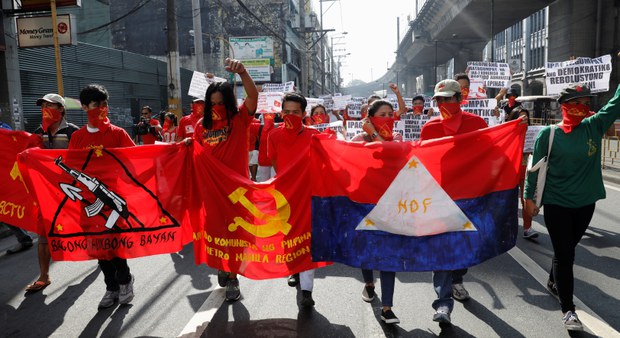Philippine Justice Secretary: Murder Charges Recommended against 17 Policemen in Activists’ Deaths
2021.12.01
Manila
 Filipino protesters display banners of underground communist movements as they march along a street in Manila, March 31, 2017.
Filipino protesters display banners of underground communist movements as they march along a street in Manila, March 31, 2017.
An inter-agency body investigating extrajudicial killings in the Philippines is recommending that 17 police officers be charged with murder in the deaths of nine leftist activists during counter-insurgency operations earlier this year, the justice department indicated on Wednesday.
The activists were slain during near simultaneous raids in March that authorities launched after President Rodrigo Duterte ordered a new offensive to crush the outlawed Communist Party of the Philippines, whose military wing, the New People’s Army (NPA), has waged a decades-long insurgency.
The Department of Justice’s AO 35 Special Investigating Team made the recommendation to bring murder charges against police officers after reviewing the case into the killing of one of the nine activists, Emmanuel “Manny” Asuncion, Justice Secretary Menardo Guevarra said. Asuncion was the coordinator of the Cavite province chapter of Bagong Alyansang Makabayan (the New Nationalist Alliance), a leftist group.
“In the case of the death of Emmanuel Asuncion, the AO 35 SIT has recommended the filing of murder charges against certain law enforcement agents involved in the incident,” Guevarra told reporters in Manila.
A subpoena issued by a state prosecutor dated Nov. 26 named 17 officers, including two lieutenants. They were summoned to appear before the court on Jan. 11 and Jan. 25. BenarNews reporters saw the order on Wednesday.
According to claims by human rights groups, the police and the military are targeting civilian organizations, alleging they were acting as fronts for the communist party.
Asuncion died during a police raid of a workers’ union group in Cavite, just south of Manila, on Mar. 7. Photos released by a labor group, the May First Movement, showed streaks of blood, indicating that Asuncion’s body may have been dragged from the second floor down a flight of stairs to the ground floor. Six other activists were arrested during the operation.
The same day, police and the military also raided other sites in the provinces of Rizal, Batangas, and Laguna, as part of a coordinated dragnet involving massive troop deployments.
Eight other activists were also killed during the operations, a day which has come to be widely dubbed here as the “Bloody Sunday” raids. President Duterte had earlier issued orders for security forces to end the communist rebellion and canceled peace negotiations with the insurgents, accusing them of carrying on with attacks amid the talks.
“I’ve told the military and the police that if they find themselves in an armed encounter with the communist rebels, kill them, make sure you really kill them and finish them off if they are alive,” the president had said in his order.
Meanwhile on Wednesday, at least eight suspected communist rebels were killed in a clash in a mountainous area near Miagao, a town in Iloilo province, the state-run Philippine News Agency reported, quoting a statement by the Philippine Army’s 301st Infantry Brigade. Through the operation, the military unit foiled an alleged plan by the group to attack a military patrol base in the town, the agency reported.
Other cases under review
Guevarra, the justice secretary, also said the National Bureau of Investigation (NBI) has been investigating the death of couple Chai and Ariel Evangelista, members of a left-leaning environmental organization, who were among those killed in the raids.
“In the case of the death of the Evangelista spouses, the NBI is winding up its interviews of witnesses, and the special investigating team report will be out in about two weeks,” he said.
According to an examination conducted by the University of the Philippines’ (UP) College of Medicine last July at the request of the victims’ families, experts said that the activists were “really shot to be killed.”
“All of them have shots in the chest. They were really shot to be killed,” said Dr. Raquel Fortun, a UP forensic pathologist. She added that “the gunshot wounds, bullet holes were altered” and stitched up, while organs of some of the bodies were already taken out and randomly cut.
Renato Reyes, secretary-general of the activist group Bagong Alyansang Makabayan (New Patriotic Alliance), called for the police officers to be charged with murder.
“It was this year that we joined the victims in a dialogue with the [Department of Justice’s AO 35 unit] with the hopes that a thorough investigation would happen, and charges filed against the perpetrators of the killings,” he said in a statement, as he appealed for justice for the other victims.
“All the nine killed in the police raids were unarmed and were murdered. They deserve justice,” Reyes added
Cristina Palabay, who heads the human rights group Karapatan, said that members of the government’s anti-communist body who had accused the activists of being communist rebels should also be held accountable.
“All victims of the Bloody Sunday raids deserve no less than justice,” Palabay said, and those who incited the attacks “should likewise be investigated for their accountability in these killings.”
Jeoffrey Maitem and Mark Navales in Cotabato City, Philippines, contributed to this report.







